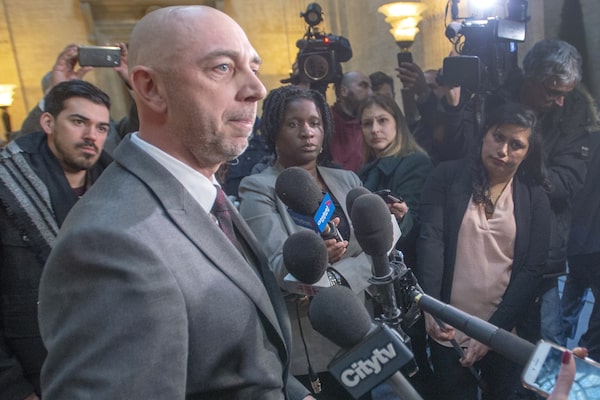
Imperial Tobacco spokesman Eric Gagnon speaks to the media after the Quebec Court of Appeal's decision to uphold a Superior Court ruling in two class-action lawsuits against three tobacco companies on March 1, 2019, in Montreal.Ryan Remiorz/The Canadian Press
Imagine the hysteria that would ensue if Canada’s Big Six banks all sought court protection from creditors. Or telecom giants Bell, Rogers and Telus.
That is the reality in the tobacco industry. In the span of two weeks, the three companies that control virtually all cigarette sales in Canada have gone to bankruptcy court, arguing they can’t pay everything they owe.
The peculiar thing is that Imperial Tobacco, JTI-Macdonald and Rothmans, Benson & Hedges are incredible cash-generating machines. Consumers continue to buy their cigarettes and vaping products with little regard to price, spinning off a steady stream of profits for their foreign owners, according to court filings by the companies.
But the industry is facing what Imperial Tobacco calls an “existential threat.”
The problem is the accumulated weight of litigation. Imperial Tobacco – by far the largest of the three companies – says damages from various health-related lawsuits could run into the hundreds of billions of dollars, exceeding its assets by “many orders of magnitude” and leaving the company “clearly insolvent.”
The litigation threat is hardly new. For two decades, Canadian tobacco companies have been doggedly fighting class-action lawsuits launched by people sickened from smoking as well as claims from governments seeking to recover health costs.
What has changed is that, after years of litigation, the industry is finally facing a massive payout. Quebec’s highest court this month upheld a $13.5-billion class-action judgment against the industry – one of the largest damage awards in Canadian history. And the companies have been forced to put almost $1-billion on deposit to cover initial payments to roughly 100,000 plaintiffs.
A theoretical risk has become all too real.
The tobacco industry now wants all those claims frozen so it can reach a “global settlement” – not just with the Quebec claimants, but with all claimants, including provincial and territorial governments. As Imperial Tobacco says in its Companies’ Creditors Arrangement Act filing: “It would be fundamentally unfair to other persons with tobacco claims [if the company’s] resources were exhausted in attempting to satisfy the Quebec appeal judgement simply because the Quebec plaintiffs were the first across the finish line.”
It’s a powerful argument. If forced to pay the claims in full, there wouldn’t be a company left to cut a cheque.
The situation has created a Hobbesian choice for plaintiffs, governments and health-care advocates. Ottawa and the provinces depend on tobacco sales for billions of dollars in excise and sales tax revenue. Without a tobacco industry, the government would lose that source of cash to generate taxes or to settle the numerous lawsuits.
Worse, the demise of the three companies would not spare Canadians from the harmful effects of smoking and vaping. New companies – perhaps ones owned by the same U.S., British and Japanese companies that dominate the global industry – would quickly step in to fill any void in the market. After all, tobacco remains a legal product in this country.
Imperial Tobacco has asked the Ontario Superior Court to appoint Warren Winkler, a former Ontario chief justice, as an impartial third party to represent the interests of claimants. A hearing has been set for early April, at which time the other companies and claimants could choose to echo the request.
In essence, the tobacco industry wants the court to sanction a process that would allow the companies to stay in business – during those negotiations and afterward.
Sorting this out will be a daunting task, with plenty of unanswered questions. For starters, how much cash can claimants squeeze from the companies without destroying them? Imperial Tobacco says the various claims facing the industry exceed $500-billion, plus interest and court costs.
It’s not just about money.
The tobacco industry is evolving. The share of the population that consumes traditional cigarettes continues to decline as fewer Canadians take up smoking. But more young people are embracing vaping products, which are also harmful but generally not subject to the steep excise taxes that apply to combustible tobacco. Regulators should be thinking about ways to mitigate the future harm and health costs associated with tobacco consumption so they aren’t back in court 20 years from now.
It’s still unclear how committed to a settlement the tobacco industry really is. All three companies are weighing possible appeals of the Quebec award to the Supreme Court of Canada – a signal they may still opt to fight rather than cave.
It’s now up to the provinces and claimants to figure out what they want – and, more importantly, how much they can realistically expect to get.